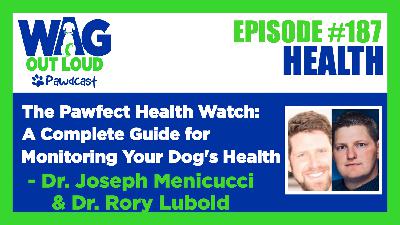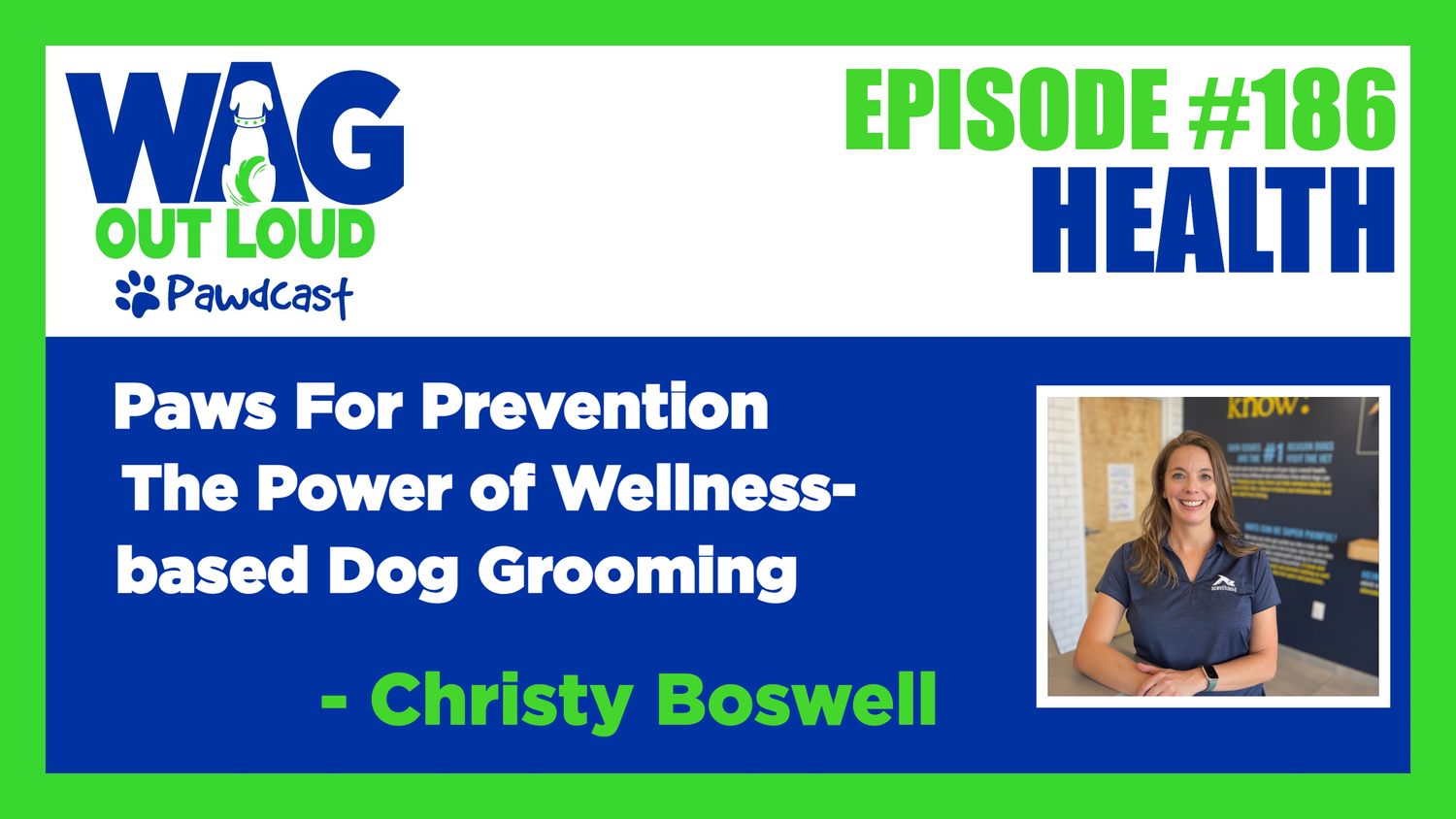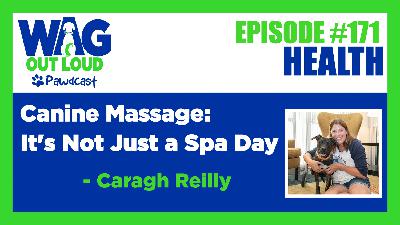The Pawfect Health Watch: A Complete Guide for Monitoring Your Dog’s Health
Update: 2023-11-01
Description
Hello dog parents! This is Krista with Episode #187 on the Wag Out Loud pawdcast. Just checking to see if you have looked into the amazing trusted brands that I highly recommend. And these are products that I have researched and tried that I know, like and trust. And these products will help your dog to thrive as well. So just go to WagOutLoud.com and check out the trusted brands section. And I've negotiated discounts for most of the products, so why not see what can make a difference in your dog's life? And don't forget to also check out the resources page as well, because it's filled with so many very important resources for both you and your dog.
Here is some good news. Pet Food Labels are getting an overhaul starting next year in 2024. And it's going to look more like human nutrition labels, which should make them easier to understand. The Nutrition Facts box will replace the current Guaranteed Analysis section and the calorie statement and also new, there's going to be a specific statement of intended use. For example 100% complete food for adult dogs. And an optional label item will be handling and storage instructions.
Welcome to the Wag Out Loud pawdcast, where we are obsessed with bringing you helpful tips on canine health care, nutrition, and overall wellbeing. If you'd like to support the show, check out the amazing online events, products and resources that I personally recommend on the Wag Out Loud website. I'm your host, Krista and I'm super excited to be bringing you yet another tail wagging episode.
Hello again dog lovers. Thanks for tuning in to a nother informative Wag Out Loud pawdcast episode. Today. I am so lucky to have not one, but two guests. With me today is Dr. Rory Lubold and Dr. Joe Menicucci. And they are here to chat about the Pawfect Health Watch: a complete guide for monitoring your dog's health. And that's what we're all about. Right, is dog health. So gentlemen, welcome to the Show.
Thanks for having us.
Yeah, thank you.
Well, I'm excited. We've had this on the books for quite a while. Before we get started. Why don't each of you introduce yourselves and tell us why you wanted to cover this topic that we're discussing right now on how to monitor our dog's health?
Absolutely, we'd love to like give you some background, my name is Rory Lubold. I'm a veterinarian, practicing exclusively in the emergency realm and really love this topic, because it's so important to really focus on on preventative care and maintenance of health and identifying diseases early, so the pets don't get sick or have it more mild if they do. And so this is a really important topic for me because it helps keep our pets out of emergency rooms or being sick for any reason that we can avoid.
Yeah, and my name is Dr. Joe Menicucci. I'm a veterinarian as well. Actually, Rory and I have been We were classmates, but then also friends for oh, 19 years now. So excited to do this together. We both have like he was saying a passion for pets and making sure that they're healthy. So yeah, my background is that I've done a lot of mixed animal medicine, a lot of mobile stuff. So I would be going to the pet parents’ house and doing more the wellness and care there. So thank you for having us on.
Well, I'm glad you're here to give us a great educational opportunity. So we're gonna be covering the this is a really crucial topic, everybody. Pet Health Management, of course, specifically, we're focusing on dogs. And gentlemen, when we originally spoke, you said that as a dedicated pet parent, our responsibility really goes beyond just providing you know, the food, the shelter, and of course, lots of love. But now we need to understand how to monitor our dog's health to ensure that they do have a happy and healthy life. So I know there's a protocol that you suggest. So why don't we start there and unpack what that protocol looks like.
THE PROTOCOL OF MONITORING
Great. Happy to dive into that a little bit. So obviously, as you've mentioned, Food, shelter and love are the first key components, right? Good healthy food and, and great, great home for them. It's so, so important. The next step beyond that really is focusing on on monitoring. And so there are some things that are pretty, pretty standard monitoring protocol that that everybody's probably familiar with. You check the stool sample for worms for puppies, and you do heartworm testing every year. And those are, those are a great start, there's really a next step beyond that. And it depends a little bit on your region, depends a little bit on what kind of pet you have more age they are. So this is really kind of custom tailored. And we do recommend consulting with your veterinarian, as well, because this is a partnership on how do we keep them healthy as long as possible, and have them live as good a life as possible. So the policies or the protocol, rather, that we we recommend, typically says you know, in most areas of the country, checking a stool sample every every year is probably good enough, in some areas every six months is probably is probably ideal, because there's areas that are have a higher load of parasites. And so that's really important that you're checking stool samples more frequently. In pets that are over three, four or five years old dogs and cats. What we really recommend as veterinarians and most veterinarians have found to be really helpful is starting to check anually for organ functions. So you can certainly check that younger as well. And anytime at about three years old, we really should be looking for organ functions like liver, kidneys, bone marrow function, urinalysis, which is such a key component to that as well. And so you know, we really believe that that annual monitoring is sort of a minimum. And then and then once they get up to the 5, 6, 7 range, being able to check them every six months, is really key. And in some areas that also includes infectious diseases like tick ,tick borne diseases and fungal diseases.
Right. And Dr. Roy, I am glad that you are talking about this. Because we really need to get a baseline on our animals to find out, you know, what's normal for them? Can you talk about the baseline information? What it helps us with? And when, h ow soon should we start, you know, monitoring all of these different areas.
HAVE A BASELINE
Yeah, I think the baseline is so important to really understand that you need to kind of look at it and say a single point in time gives us some good information. So data that we take, say we take a blood test today, that's really important. But if we take that blood test again, in six months or a year, the change between today and then is one of the biggest things that that we as veterinarians will look at. And so it's not just a single point in time, but being able to watch trends and being able to better understand what these changes mean for them, allows us to intervene, change the nutrition, change the medications, change lifestyle, that will actually help to stave off some of the medical conditions that are coming. I think as we as we move into the sort of the machine learning and extra data, stuff that's happening in the world, there's obviously a lot of that happening, that trend is going to be even more important because we're going to see more detail from from having baselines, and then figuring out what changes in three 6-12 months to be able to predict future diseases and head them off before they actually become a problem.
And when we take our dogs to the vet, besides, you know, the eye, ears, nose, heart, the diagnostics that we've just mentioned, you know, the stool sample, urinalysis, what about CBC? How detailed should we get with a blood panel.
BLOOD WORK
So typically, for the blood panel, we're going to recommend at least the core core workup. And that's going to be a CBC which is going to look at all the main cells, red blood cells, and white blood cells and platelets, and a lot of different parameters in there. We also want to see a chemistry that's going to look at the at least the basic organ function for kidney enzymes, liver and pancreas stuff. And so it's really going to get a full picture of how everything works together. And so those are the things that we add in honestly, and this is probably one of the tests to get sort of overlooked the most. But urinalysis to me is still one of the key components there because there’s so many things that will show up in the urine And that's actually pretty easy to test for it's relatively easy to collect the sample. And really that allows us to tell a lot about diabetes and kidney function, liver function, a lot of different things too. especially great for male cats and certainly for for other other pets as well.
And is it better for us to collect that before we come into the practice or have you guys get a fresh sample?
URINALYSIS AND STOOL SAMPLES
Depends a little bit if you're talking about urine explicitly, then sense a little bit on what the what we're looking for. This is something that we suspect there like a UTI, it's always better for us to collect those samples in the hospital, which have cleaner methods of collecting them. If we're just looking for kind of a routine monitoring, and that's something that can be collected at home, pretty easily collected at home and stored in an airtight container, in the refrigerator, put in the bag and put it in the fridge. many times that’s the less stressful way to do it, not nearly as clean. So if we're going to do this, we're looking for bacteria. That's not the ideal situation. But for routine monitoring that works very nicely.
And would the same go for a stool sample airtight in the frigerator. For how long? How long would it be good for?
Correct? Yeah, so the stool samples are a little bit less finicky about being refrigerated. And I always worried a little bit about things in store stool samples in the fridge where we make meals. That's always a
Here is some good news. Pet Food Labels are getting an overhaul starting next year in 2024. And it's going to look more like human nutrition labels, which should make them easier to understand. The Nutrition Facts box will replace the current Guaranteed Analysis section and the calorie statement and also new, there's going to be a specific statement of intended use. For example 100% complete food for adult dogs. And an optional label item will be handling and storage instructions.
Welcome to the Wag Out Loud pawdcast, where we are obsessed with bringing you helpful tips on canine health care, nutrition, and overall wellbeing. If you'd like to support the show, check out the amazing online events, products and resources that I personally recommend on the Wag Out Loud website. I'm your host, Krista and I'm super excited to be bringing you yet another tail wagging episode.
Hello again dog lovers. Thanks for tuning in to a nother informative Wag Out Loud pawdcast episode. Today. I am so lucky to have not one, but two guests. With me today is Dr. Rory Lubold and Dr. Joe Menicucci. And they are here to chat about the Pawfect Health Watch: a complete guide for monitoring your dog's health. And that's what we're all about. Right, is dog health. So gentlemen, welcome to the Show.
Thanks for having us.
Yeah, thank you.
Well, I'm excited. We've had this on the books for quite a while. Before we get started. Why don't each of you introduce yourselves and tell us why you wanted to cover this topic that we're discussing right now on how to monitor our dog's health?
Absolutely, we'd love to like give you some background, my name is Rory Lubold. I'm a veterinarian, practicing exclusively in the emergency realm and really love this topic, because it's so important to really focus on on preventative care and maintenance of health and identifying diseases early, so the pets don't get sick or have it more mild if they do. And so this is a really important topic for me because it helps keep our pets out of emergency rooms or being sick for any reason that we can avoid.
Yeah, and my name is Dr. Joe Menicucci. I'm a veterinarian as well. Actually, Rory and I have been We were classmates, but then also friends for oh, 19 years now. So excited to do this together. We both have like he was saying a passion for pets and making sure that they're healthy. So yeah, my background is that I've done a lot of mixed animal medicine, a lot of mobile stuff. So I would be going to the pet parents’ house and doing more the wellness and care there. So thank you for having us on.
Well, I'm glad you're here to give us a great educational opportunity. So we're gonna be covering the this is a really crucial topic, everybody. Pet Health Management, of course, specifically, we're focusing on dogs. And gentlemen, when we originally spoke, you said that as a dedicated pet parent, our responsibility really goes beyond just providing you know, the food, the shelter, and of course, lots of love. But now we need to understand how to monitor our dog's health to ensure that they do have a happy and healthy life. So I know there's a protocol that you suggest. So why don't we start there and unpack what that protocol looks like.
THE PROTOCOL OF MONITORING
Great. Happy to dive into that a little bit. So obviously, as you've mentioned, Food, shelter and love are the first key components, right? Good healthy food and, and great, great home for them. It's so, so important. The next step beyond that really is focusing on on monitoring. And so there are some things that are pretty, pretty standard monitoring protocol that that everybody's probably familiar with. You check the stool sample for worms for puppies, and you do heartworm testing every year. And those are, those are a great start, there's really a next step beyond that. And it depends a little bit on your region, depends a little bit on what kind of pet you have more age they are. So this is really kind of custom tailored. And we do recommend consulting with your veterinarian, as well, because this is a partnership on how do we keep them healthy as long as possible, and have them live as good a life as possible. So the policies or the protocol, rather, that we we recommend, typically says you know, in most areas of the country, checking a stool sample every every year is probably good enough, in some areas every six months is probably is probably ideal, because there's areas that are have a higher load of parasites. And so that's really important that you're checking stool samples more frequently. In pets that are over three, four or five years old dogs and cats. What we really recommend as veterinarians and most veterinarians have found to be really helpful is starting to check anually for organ functions. So you can certainly check that younger as well. And anytime at about three years old, we really should be looking for organ functions like liver, kidneys, bone marrow function, urinalysis, which is such a key component to that as well. And so you know, we really believe that that annual monitoring is sort of a minimum. And then and then once they get up to the 5, 6, 7 range, being able to check them every six months, is really key. And in some areas that also includes infectious diseases like tick ,tick borne diseases and fungal diseases.
Right. And Dr. Roy, I am glad that you are talking about this. Because we really need to get a baseline on our animals to find out, you know, what's normal for them? Can you talk about the baseline information? What it helps us with? And when, h ow soon should we start, you know, monitoring all of these different areas.
HAVE A BASELINE
Yeah, I think the baseline is so important to really understand that you need to kind of look at it and say a single point in time gives us some good information. So data that we take, say we take a blood test today, that's really important. But if we take that blood test again, in six months or a year, the change between today and then is one of the biggest things that that we as veterinarians will look at. And so it's not just a single point in time, but being able to watch trends and being able to better understand what these changes mean for them, allows us to intervene, change the nutrition, change the medications, change lifestyle, that will actually help to stave off some of the medical conditions that are coming. I think as we as we move into the sort of the machine learning and extra data, stuff that's happening in the world, there's obviously a lot of that happening, that trend is going to be even more important because we're going to see more detail from from having baselines, and then figuring out what changes in three 6-12 months to be able to predict future diseases and head them off before they actually become a problem.
And when we take our dogs to the vet, besides, you know, the eye, ears, nose, heart, the diagnostics that we've just mentioned, you know, the stool sample, urinalysis, what about CBC? How detailed should we get with a blood panel.
BLOOD WORK
So typically, for the blood panel, we're going to recommend at least the core core workup. And that's going to be a CBC which is going to look at all the main cells, red blood cells, and white blood cells and platelets, and a lot of different parameters in there. We also want to see a chemistry that's going to look at the at least the basic organ function for kidney enzymes, liver and pancreas stuff. And so it's really going to get a full picture of how everything works together. And so those are the things that we add in honestly, and this is probably one of the tests to get sort of overlooked the most. But urinalysis to me is still one of the key components there because there’s so many things that will show up in the urine And that's actually pretty easy to test for it's relatively easy to collect the sample. And really that allows us to tell a lot about diabetes and kidney function, liver function, a lot of different things too. especially great for male cats and certainly for for other other pets as well.
And is it better for us to collect that before we come into the practice or have you guys get a fresh sample?
URINALYSIS AND STOOL SAMPLES
Depends a little bit if you're talking about urine explicitly, then sense a little bit on what the what we're looking for. This is something that we suspect there like a UTI, it's always better for us to collect those samples in the hospital, which have cleaner methods of collecting them. If we're just looking for kind of a routine monitoring, and that's something that can be collected at home, pretty easily collected at home and stored in an airtight container, in the refrigerator, put in the bag and put it in the fridge. many times that’s the less stressful way to do it, not nearly as clean. So if we're going to do this, we're looking for bacteria. That's not the ideal situation. But for routine monitoring that works very nicely.
And would the same go for a stool sample airtight in the frigerator. For how long? How long would it be good for?
Correct? Yeah, so the stool samples are a little bit less finicky about being refrigerated. And I always worried a little bit about things in store stool samples in the fridge where we make meals. That's always a
Comments
In Channel
























